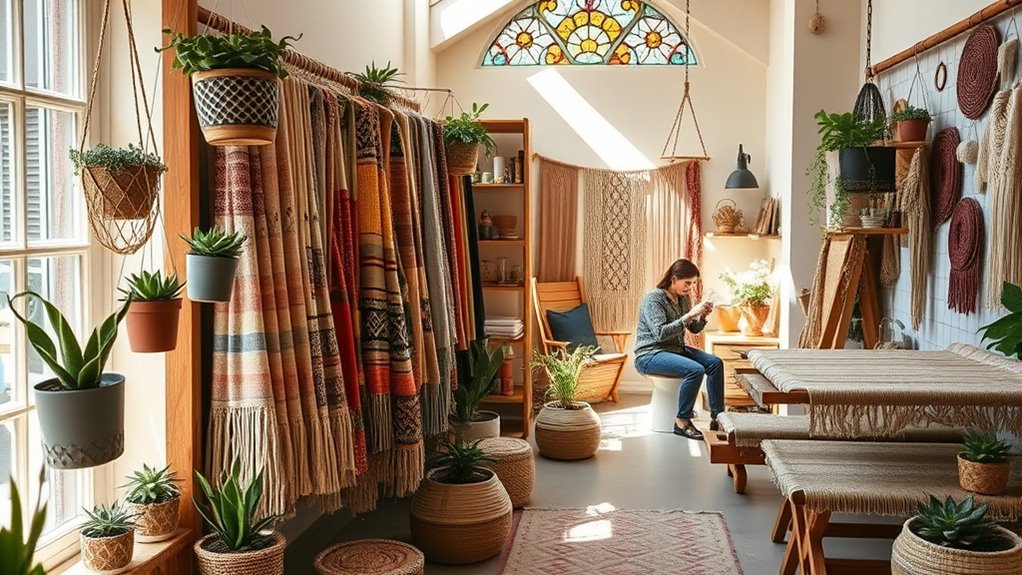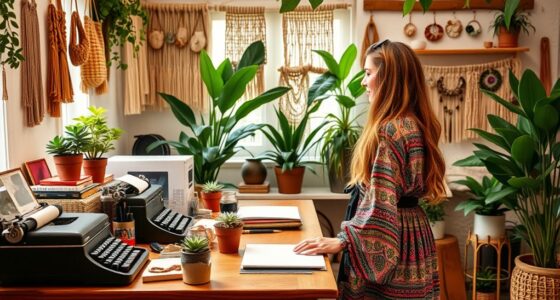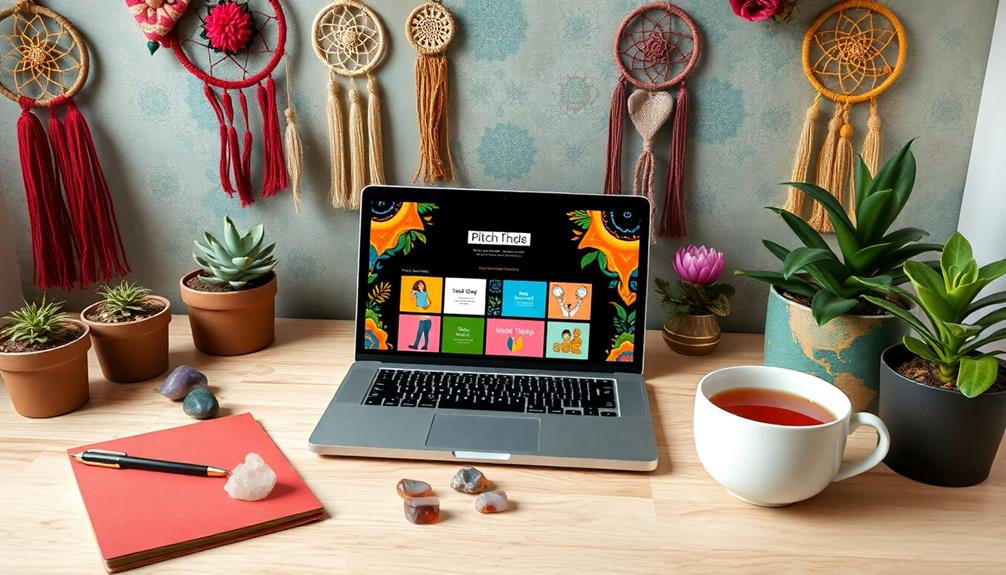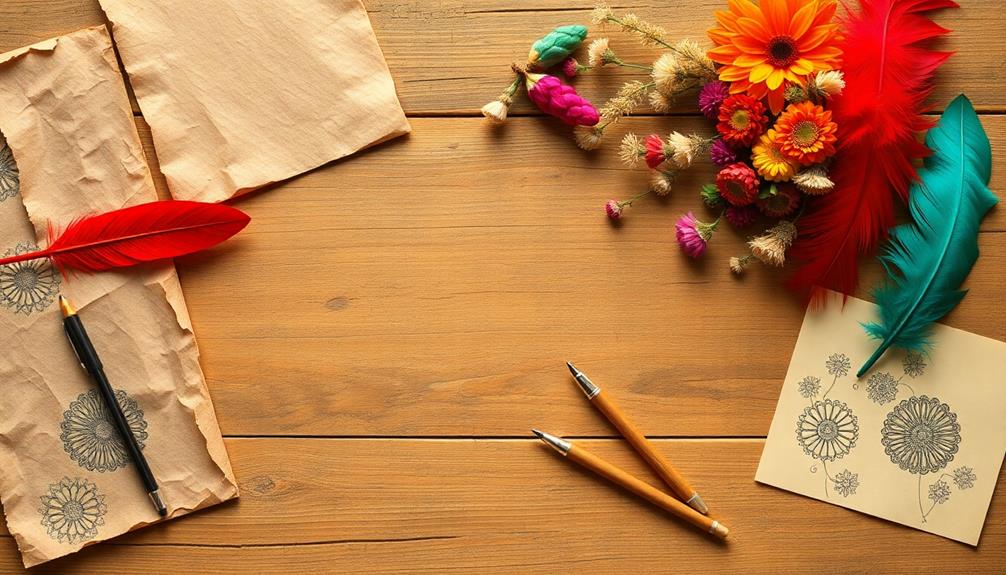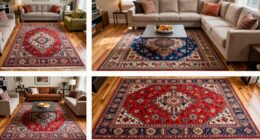To make your boho business more sustainable, focus on eco-friendly materials like organic cotton, hemp, and recycled fabrics. Commit to ethical practices by ensuring fair wages and transparent supply chains, supporting local artisans, and reducing transportation emissions. Use sustainable production methods, such as low-impact dyes and durable designs, to lessen waste. Embrace circular strategies like recycling and repairs to extend product life, and protect your digital presence responsibly. Keep exploring for more ways to enhance your eco-conscious journey.
Key Takeaways
- Use organic textiles like cotton and hemp, and incorporate recycled fabrics to reduce environmental impact.
- Ensure fair trade practices and support local artisans to promote ethical sourcing and community development.
- Adopt natural dyes and water-efficient techniques to minimize pollution and conserve resources.
- Implement circular business models by recycling, upcycling, and offering repair services to extend product life.
- Protect customer data and brand integrity through responsible cybersecurity and transparent, eco-conscious messaging.
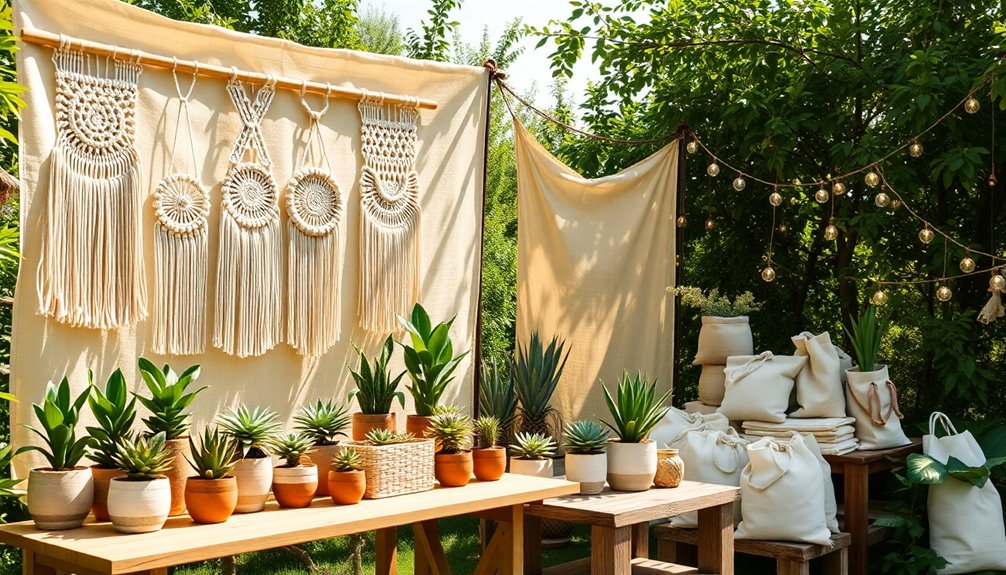
If you want your boho business to thrive sustainably, prioritizing eco-friendly materials and ethical practices is essential. Sourcing organic textiles like organic cotton and hemp helps reduce your environmental footprint, as these materials are grown without harmful chemicals and require less water.
Incorporating recycled fabrics into your collections not only diverts waste from landfills but also supports a circular economy, where materials are reused and repurposed instead of discarded. Using recycled textiles demonstrates your commitment to sustainability and appeals to conscious consumers who value low-impact, environmentally responsible products.
Focusing on ethical practices is equally important. Ensuring fair trade standards and transparent supply chains guarantees that artisans and workers receive fair wages, work in safe conditions, and are respected throughout the production process.
Supporting local artisans fosters community development and helps preserve traditional crafts, which adds authenticity and uniqueness to your offerings. By emphasizing local sourcing, you minimize transportation emissions, contributing to a smaller carbon footprint and strengthening local economies.
Transparency in your supply chain builds trust with your customers, who increasingly seek brands that openly share their sourcing and manufacturing practices.
In your production process, adopt low-impact dyes and water-efficient techniques to minimize pollution and conserve resources. Natural or plant-based dyes are eco-friendly alternatives to conventional chemical dyes, reducing water contamination and health risks for workers.
Implementing water-saving methods in dyeing and finishing processes further diminishes resource consumption. Durability is another key factor; designing products that last longer discourages fast fashion and reduces waste.
Using high-quality, artisanal craftsmanship not only creates durable items but also supports traditional skills, ensuring their survival in a modern market.
Supporting a circular business model enhances your sustainability efforts. Recycling, upcycling, and offering repair services extend the lifespan of your products, reducing textile waste and encouraging conscious consumption.
Customers appreciate brands that promote reuse and provide options to restore or reinvent items rather than discarding them. This approach fosters loyalty and positions your boho business as a responsible, eco-conscious choice.
Additionally, integrating ethical hacking principles into your digital security strategies can safeguard your online presence and customer data, reinforcing your commitment to responsible business practices.
Frequently Asked Questions
What Are Some Examples of Sustainable Business Practices?
You can adopt sustainable practices by choosing eco-friendly materials like organic cotton and recycled fabrics for your products.
Guarantee your supply chain is transparent, supporting fair labor and local artisans.
Implement waste reduction methods such as upcycling and zero-waste cutting.
Use biodegradable packaging and eco-conscious dyes, and power your operations with renewable energy.
Certification programs like Fair Trade and B Corp can help verify your commitment to ethical, sustainable business practices.
What Can Businesses Do to Be More Sustainable?
To be more sustainable, you can start by sourcing eco-friendly materials like organic or recycled fabrics.
Be transparent about your supply chain and seek certifications like Fair Trade or B Corp.
Minimize waste through upcycling and recycling programs, and cut water and energy use by adopting efficient machinery and renewable energy.
Prioritize ethical labor practices, ensuring fair wages and safe conditions for artisans, which boosts your brand’s integrity and sustainability.
What Is an Example of Sustainability in Fashion?
You might be surprised to learn that sustainability in fashion isn’t just about eco-friendly fabrics. For example, a brand that uses recycled fabrics and low-impact dyes shows real commitment.
By ensuring fair wages and safe working conditions, they promote social responsibility too.
Incorporating circular design principles, like take-back programs, extends clothing life and reduces waste.
These practices demonstrate how fashion can be both stylish and sustainable.
What Is the Most Sustainable Way to Make Clothing?
The most sustainable way to make clothing involves choosing eco-friendly materials like organic cotton, hemp, or recycled fabrics to lessen environmental impact.
You should use low-impact dyeing methods, such as natural dyes, to cut water and chemical pollution.
Additionally, prioritize fair labor practices, design for durability and recyclability, and use renewable energy and water-saving technologies in production.
These steps help you create environmentally responsible, ethical clothing.
Conclusion
By embracing sustainable practices, you transform your boho business into a vibrant oasis of eco-consciousness. Picture your workspace alive with the gentle hum of recycled materials, and your products echoing the earthy whispers of nature. Every mindful choice you make paints a brighter, greener future—where your passion blooms alongside the planet’s well-being. Keep nurturing that harmony, and watch your business flourish as a beacon of authenticity and sustainability in the boho world.

